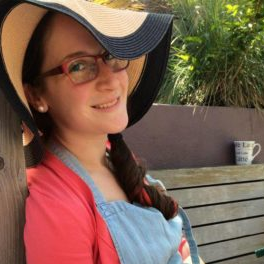
Contact: leahr at berkeley dot edu
Research Interests: I’m primarily interested in tangible learning as a means to concretely explore math concepts and if/how studying math in a physical context differs from a symbolic context. Currently, this interest in manifested in the design of tabletop and floor-based machines/models/toys to play around with concepts in geometry, trigonometry, and calculus. Recently I’ve been working on Geometris, which is a little bit like Twister meets DanceDanceRevolution but for geometry. Check out the demo video below!
Personal Background: I’m a 5th-year PhD candidate in EMST, also pursuing a Designated Emphasis in New Media. I grew up in a suburb of Milwaukee, Wisconsin, just a few blocks from Lake Michigan. After finishing my undergrad degree in math at Scripps College, I worked for 3 years as a data analyst in San Francisco, where I enjoyed sampling all the food that city has to offer. In my free time, I like to cook, bake, take my dog on hikes, and climb inconsistently (only bouldering – I’m afraid of heights).
Publications:
- Rosenbaum, L. F., & Hartmann, B. (2017). Where be dragons? Mapping the known (and not so known) areas of research on academic makerspaces.Paper presented at the 2nd Annual International Symposium on Academic Makerspaces (ISAM 2017), Cleveland, OH: Case Western Reserve University.(Read More)
- Rosenbaum, L. F., Kaur, J., & Abrahamson, D. (2020). Shaping perception: Designing for participatory facilitation of collaborative geometry.In R. Nemirovsky & N. Sinclair (Eds.), “On the intertwined contributions of physical and digital tools for the teaching and learning of mathematics” <Special issue>. Digital Experiences in Mathematics Education, 6(2), 213–232. https://doi.org/10.1007/s40751-020-00068-2(Read More)
- Durán–López, E., Rosenbaum, L. F., & Iyer, G. V. (2017). Geometris: Designing collaborative mathematical interactions for children.P. Blikstein, D. Abrahamson, M. Worsley, & J. Fails (Eds.), “Logo: The Next 50 Years” – Proceedings of the 16th annual Interaction Design and Children conference (IDC 2017) (Vol. “Demos,” pp. 697-700). Stanford University: IDC.(Read More)
- Durán–López, E., Iyer, G. V., Rosenbaum, L. F. (2017). Geometris: A collaborative embodied geometry game G. Mark, S. Fussel, F. Mueller, & J Tanenbaum (Eds.), “Explore Innovate Inspire” – Proceedings of the 35th annual Conference on Human Factors in Computing Systems (CHI 2017) (Vol. “Student Game Competition,” pp. 214-217). Denver: CHI.(Read More)
- Abdullah, A., Adil, M., Rosenbaum, L. F., Clemmons, M., Shah, M., Abrahamson, D., & Neff, M. (2017). Pedagogical agents to support embodied, discovery-based learning.J. Beskow, C. Peters, G. Castellano, C. O’Sullivan, I. Leite, & S. Kopp (Eds.), Proceedings of 17th International Conference on Intelligent Virtual Agents (IVA 2017) (pp. 1-14). Cham: Springer International Publishing.(Read More)
- Rosenbaum, L. R., & Abrahamson, D. (2016). Back to the drawing board: On studying interaction with mechanical design.M. B. Wood, E. E. Turner, M. Civil, & J. A. Eli (Eds.), Sin fronteras: Questioning borders with(in) mathematics education – Proceedings of the 38th annual meeting of the North-American Chapter of the International Group for the Psychology of Mathematics Education (PME-NA) (Vol. 13, “Theory and research methods”, pp. 1612-1615). Tucson, AZ: University of Arizona.(Read More)